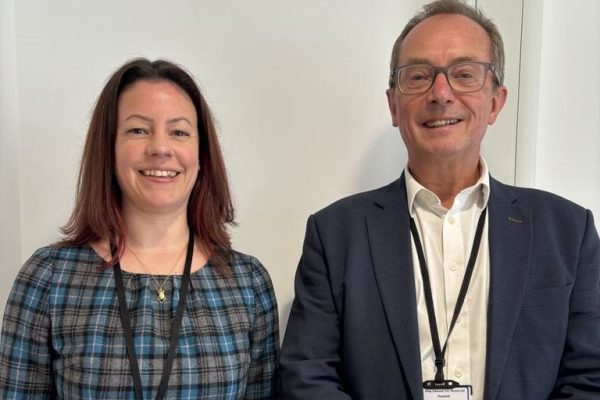HOSPITAL Inspectors inspecting the KEM Hospital in Stanley Falkland Islands do not have any serious safety concerns about the services that they have reviewed, members of the team told Penguin News this week.
Clinical Auditors Dr Jim Gardner and Professor Heidi Fuller spoke to Penguin News on Monday. They are part of a four-person team visiting the Falklands examining areas of ambulance, casualty, ward, intensive care, theatre and medical treatment overseas within the King Edward VII Memorial Hospital in Stanley.
Dr Gardner said: “What we’ve said is we’ve seen very good care within the parameters of the care that can be delivered.”
He added: “We’ve got recommendations which are really about process, about governance, but they’re not based around whether we think there should be changes to clinical practice. They’re much more about, if you like, organisational assurance. There are issues about the IT system, for example, which we think probably needs some work, but they are operational matters, which we can recommend, which are well known by the team here.”
Asked how the areas were chosen Professor Fuller said she understood the Ministry of Defence had previously undertaken inspections of other specific areas in the hospital. “Maternity was deliberately not in scope, because we were aware that there has already been an internal review and actions were generated following that review, which are being worked on, one of which was to commission an independent external review which is underway.
“We’re also aware that there’s an ongoing inquest, the results of which will be made public, we believe, and it will be up to the Coroners which parts of the internal and external view are made public.”
She added that they had been able to explore other areas including pharmacy, the laboratory and the medical engineering team. “So I think those areas are chosen because they haven’t been the focus of an independent review by the MoD previously.”
Asked what format was used to speak to patients she said a press release had been sent out to the public and they had, “received a good volume of feedback from the public, and it was it was quite balanced.”
Professor Fuller commented: “Some shared concerns with us about some areas, and others wrote and shared things that they found really, really good and were very happy with. Some of those members of the public asked then to meet with us, because they wanted to explain some aspects in greater detail, which we facilitated while we have been here. We had a meeting with them in the week. They had an opportunity to share thoughts with us on areas that I think they feel could be addressed with other interventions.”
General themes
Dr Gardner said while they were not in the Islands to deal with specific complaints he explained they did pick up some general themes.
Where those general themes were identified, “we did then pursue that through the conversations and investigation that we’ve done within the hospital. I think we are confident we have sufficient information to understand issues that were raised.”
All those themes will feature in the report.
The next step involves gathering the information together under Professor Fuller’s lead. It is intended the report will be finished by the early part of 2025.
From the outset, it was stated that the findings will be made public the Inspectors confirmed.
Exciting opportunity
Dr Gardner added that the interesting thing about the Falkland Islands was that every citizen, “is registered in the same system, and that the general practice part of the system is connected to the hospital system.
He said: “So that’s unusual, and presents an enormous opportunity for the Health Service here to think more about the longitudinal care of the population, to think more about secondary prevention, long term conditions and so forth, particularly with a new electronic patient record.”
Dr Gardner said he hoped he could get that across in the report and the Falklands would grasp the opportunity, “which then sets you up for the next 5, 10, 15 years.”
Asked to expand he said, “If you took an example of knowing all of the patients who have long term conditions such as hypertension or type two diabetes or lung disease and so forth, then you can have well organized programmes to help those citizens look after themselves over the next periods of time, and intervene more effectively. They are classic public health approaches to long term care.
Speaking of challenges currently being faced by NHS hospitals, and how they differed from those faced by the KEMH, Dr Gardner (who is the Chief Medical Officer of University Hospitals Liverpool) said the obvious challenge challenge was one of demand.
He said, “We have bed occupancy in the high 90%. We almost always have some queuing of patients in our emergency departments. Time to be seen goes up. We’ve got 20% of our beds with patients who we would say don’t meet the criteria to reside. In other words, our medical teams think they’ve done everything they can medically for those sorts of patients, and we can’t get them away from hospital, back home or into their other social care settings.”
Dr Gardner said as such pressures on the NHS system in the UK were enormous, “and it isn’t just about the UK. We’ve heard the same story from Canada, for example. So this is a problem, if you like, of modern Western world post COVID. To come here and find there are beds available on the ward. The ward is well staffed with very skilled nursing colleagues and medical colleagues. That’s really refreshing to see, and should give a lot of encouragement and reassurance to the population of the Falkland Islands, because it isn’t like that in other parts of the world. In other words, there are a lot of things here that are better.”
He added that he thought “our standards of medical care back in the United Kingdom are still excellent. And of course, we have a lot of data to prove that.
He felt the standards of care in the Falklands were also excellent but, “the data comparators are harder because you don’t have as much data for a start, so you have to go on a more case by case basis, but what I’ve seen is within the parameters of what can be delivered safely in this environment, I’ve seen excellent care.”
The hospital inspection concluded on Monday after five days.
Health and Medical
Services Committee coverage
The four inspectors were reduced to three working on the review after one was taken ill, said Director of Health John Woollacott at the Health and Medical Services Committee on Wednesday.
Mr Woollacott thanked the whole of the inspection team as well as the hospital staff, who, he said, had felt at ease speaking with the inspectors.
He explained that the Inspectors made such good progress that they also looked at the pharmacy and Laboratory provision.
Initial feedback was positive and Mr Woollacott said that in the areas looked at they found “no serious safety concerns or matters that needed urgent attention.”
The Inspectors were impressed with the level of care provided, comparing it to a “private level” of hospital care. Mr Woollacott added that the atmosphere was good among the staff and commended the team.
The inspection team were also interested in the Health Service and the Government’s strategy to tackle preventable health care, and as to how to make the service sustainable for the future.
There were some comments on the scrutiny and governance within the service as the Falkland Islands does not have a hospital board as hospitals in the UK do.
Mr Woollacott concluded that the document that will be produced on the inspection will be large and it will take a while to analyse the report which is expected to be received in the new year.














